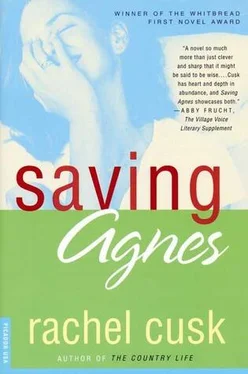‘Why didn’t you tell me?’ Agnes demanded.
‘There was no reason to.’ Nina shrugged away Agnes’s hand. ‘And anyway, Jack asked me not to.’
So that was it, then. If only she had looked, how much she might have learned! Had she but guessed at the shady deals, the backhand bribes, the double-crossed hearts of others, for how much might she sooner have forgiven herself? It was Agnes’s nature to emulate others, not to judge them; how happy they must have been, with her to please them as well as they pleasing themselves!
‘ He obviously didn’t want you to know,’ Nina conceded. ‘Otherwise he’d have told you, wouldn’t he? Look, maybe he was embarrassed about it. Maybe he didn’t want to hurt your feelings.’
‘What?’ Agnes laughed wildly and Nina looked startled. ‘What was it you said to me that time, about men being animals? So what are we saying now — that he didn’t want to hurt my feelings ? You’re obviously a believer these days. I suppose you also knew,’ she added, triumphant at having a revelation of her own to hand, albeit one which could inflict injury on no one but herself, ‘that he was seeing someone else all along? Maybe you thought I shouldn’t know about that as well.’
‘I didn’t know that, actually. Was he really?’
‘Don’t bother defending him!’ Agnes shrieked. ‘I won’t listen! I know where your loyalties lie — I won’t be making that mistake again!’
‘Oh, for God’s sake,’ Nina snapped. ‘Don’t get hysterical. You’re behaving like he’s a serial killer or something. Or maybe —’ she looked at Agnes curiously — ‘maybe you really are as innocent as you pretend to be. Maybe you needed to wake up. If you ask me—’
‘I don’t ask you!’ Agnes cried, putting her hands over her ears and turning to leave the room. ‘In fact, I don’t think I even like you very much.’
AGNES Day was letting herself go. The phrase did imply a certain freedom from imprisonment, but its effects were far from captivating. Hair sprouted freely over her unmown slopes, where bulges swelled like molehills. Skin sagged here and flaked there, puckering like a contour relief map. A distinct whiff of human flesh could be caught in the groves where exotic flowers used to perfume the air. Surrendering to the final molestation of art by life, Agnes abandoned her brush and palette and barely faced the world.
By becoming that which she had always feared — or perhaps had always feared she already was, underneath — Agnes knew certain things would have to be sacrificed. Men no longer looked at her as she passed, and while initially her heart had plummeted at the realisation, her spirit nestled further into the safe folds of a hermaphrodite sensibility. To think of herself as undesirable was second nature; to read it in the eyes of others was something else altogether and required some defence. She would give vent to her feelings in the privacy of her room at night, when she would cry and claw at her body with rage.
Eventually, however, she came to see that her despoilment carried within it its own defence. Her blank face and new folds of flesh were at once her protection from the world and her submission to it. They made her invisible. In times of despair she was tempted to return to her old ways, but never tried for fear of discovering that she couldn’t. Her renunciation of those things seemed to her then to have meant nothing but the death of everything she had once held dear.
Her career at Diplomat’s Week, meanwhile, began to flourish. She became expert at locating errors and discrepancies, and on more than one occasion saved the day by insistently carrying out last-minute checks even as the pages were being borne off to the typesetter’s. She wrote an article for the magazine and was surprised to find it accepted. She suggested new formats and saw them pass into legislature with scarcely a blinking eye.
‘We might have to give you that bonus before long,’ said Jean beamingly, who of late had been observing rather than participating in this show of labour.
‘How about me?’ said Greta. ‘I have to watch her. It makes me tired.’
Like someone who had come out of hiding, Agnes began to speak openly about her work with her acquaintances. In doing so, she discovered that it was possible, with but a modicum of glamorous embellishment, to make almost anything sound interesting if you described it in the right way. She talked about deadlines and copy dates, hymned galleys and bromides, discussed at length with fellow publishers the problems one encountered in the company of typesetters and printers. One companion was evidently so moved by her narrative that he offered to come and meet her for lunch so that the scene might be evoked in his mind more clearly.
‘Where’s your house?’ he questioned imperiously.
‘Highbury,’ replied Agnes in bewilderment, before realising to which establishment he was referring.
What irked her was the malevolent coincidence with which the application of her workmates seemed to falter in direct proportion to her own increase in zeal. At first she had thought this was merely the fault of her own altered perspective, but it soon became clear that Jean and Greta had fallen prey to rogue circumstances. Greta seemed detached and morose; Jean, on the other hand, radiated a nervous joy of the type which automatically generated its antithesis in those who encountered it. She had lost weight and begun to wear make-up. She arrived late, appeared distracted for most of the day, and left early. Agnes wondered if she and Jean had somehow exchanged personalities in a midnight astral collision.
‘She’s like a goddamned mosquito,’ complained Greta. ‘Zip zip, buzz buzz — THWACK!’ She grinned. ‘I used to have this really neat electronic insect exterminator back home.’
The strange coincidence of Jean’s new-found ecstasy with a sudden recurrence of phone calls from someone called David from the Church of Christ the Evangelist, as he unfailingly announced himself, could not but solve the mystery.
‘So what’s with this David geezer?’ Greta boldly asked. She had lately taken to spicing up her narrative with eclectic touches of native vocabulary. Agnes saw it as a bad sign that she had resumed relations with London Transport. ‘Are you two going together or what?’
‘In a manner of speaking,’ Jean replied. ‘If that’s how you want to put it.’
‘I do,’ Greta assured her.
‘Well, I suppose we do see each other quite often,’ replied Jean, feigning a puzzlement designed to suggest she had never thought of it in quite that way before. ‘He’s a very nice man — so, so dignified, if you see what I mean.’
‘Dignified Dave,’ said Greta rolling her eyes. ‘Hot damn.’
Further questioning revealed that David was a born-again Christian and that Jean had lately taken to accompanying him to church. It was really very interesting, she said. Quite fascinating, in fact.
‘She must love him,’ opined Greta as Jean left the office. ‘She must love him a lot.’
When Agnes thought of love, she saw her lover, or her ex-lover as he should now be called, thus in visions: the sucking syringe finger, the sweet steel needle, penetrating himself as he had her once upon a time. She knew nothing could compete with the liquid love he channelled into his own veins, careful not to spare a drop, no love, ultimately, lost between them. She decided she should get an AIDS test and asked Nina pointedly one Saturday morning how one could best contrive to have such a thing.
‘No need,’ said Nina shortly, unruffled by Agnes’s accusing eyes and brave tone. ‘He wasn’t a junkie. He didn’t use needles.’
Читать дальше












